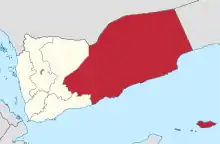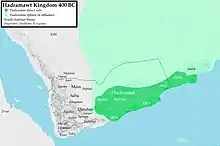Hadhrami people
The Hadhrami (Arabic: حضرمي, sing.) or Hadharem (plural: الحضارم) are people inhabiting the Hadhramaut region in Yemen and their descendants in diaspora communities around the world. They speak Hadhrami Arabic an Arabic dialect with a heavy Hadramite Substrate, which belongs to the South Semitic languages.
الحضارم | |
|---|---|
 Hadramaut Region in Yemen | |
| Regions with significant populations | |
| Languages | |
| Hadhrami Arabic, Swahili (Kenya), Somali (Somalia). | |
| Religion | |
| Islam (Sunni Shafi'i, strong Sufi-orientation) | |
| Related ethnic groups | |
| Arabs, other Afro-Asiatic people |

Among the two million inhabitants of Hadhramaut, there are about 1,300 distinct tribes.
History and diaspora
The Hadharem have a long seafaring and trading tradition that predates Semitic cultures, the Semitic Hadramites diaspora was historically the Mofarite & Gurage mercantile Semitic pioneers in East Africa, Hadramite influence was later over shadowed by the rise of the temple of the Moon governing Sabaean Semites that saw the concentration of power switch to a governing ruling class. With Governing pressure in the South Semitic regions Hadhrami seamen navigated in large numbers all around the Indian Ocean basin, from the Horn of Africa to the Swahili Coast to the Malabar Coast and Hyderabad in South India, Sri Lanka to Maritime Southeast Asia.[1] They were involved in many places as organizers of the Haj.
There are Hadharem communities in western Yemen and in the trading ports of the Arab States of the Persian Gulf and the Red Sea. The money changers in Jeddah, Saudi Arabia have usually been of Hadhrami origin.[2]
Hadhrami East Africans

The Hadhrami have long had a notable presence in the African Horn region (Djibouti, Eritrea, Ethiopia and Somalia). Hadhrami settlers were instrumental in helping to consolidate the Muslim community in the coastal Benadir province of Somalia, in particular.[3] During the colonial period, disgruntled Hadhrami from the tribal wars additionally settled in various Somali towns.[4] They were also frequently recruited into the armies of the Somali Sultanates.[5]
Some Hadhrami communities also reportedly exist in Mozambique and Comoros Madagascar.[6]
Hadhrami Jews
The vast majority of the Hadhrami Jews now live in Israel.[7]
Language
The Hadhrami speak Hadhrami Arabic, a variety of Arabic, while the Diasporas that have acculturated mainly speak the local language they live in.
Diaspora communities

- Sri Lankan Moors[8]
- Arab Indonesian
- Arab Malaysian
- Arab Singaporean
- Chaush, India
- Sodagar (Gujarati Shaikh)
- Nawayath, of Maharashtra, Goa and Karnataka;Barkas, Hyderabad, India
- Labbay of Kerala, India
- Hadhrami Jews in Israel and abroad
- Gujarati Muslims#Bharuchi and Surti Muslims The Surti Sunni Vohra Community in Gujarat that are partially of hadhrami descent
- Lemba people who claim Jewish ancestry via Hadramaut's historic Jewish population
Hadhrami people
Swahili Coast
- Awadh Saleh Sherman, Kenya, businessman
- Najib Balala, Kenya, Member of Parliament
- Ahmed Abdallah Mohamed Sambi, President of Comoros
- Habib Salih, Lamu, Kenya, religious scholar
- Jamal Bagirif, Mombasa, Kenya, entrepreneur
North Africa
- Artega tribe, Babkeer, Sudan
Horn of Africa
- Mohammed Al Amoudi, Ethiopia, businessman
Indonesia
- Abdurrahman Baswedan, Journalist
- Abdurrahman Shihab, Academican and Politician
- Abu Bakar Bashir, founder of Jamaah Islamiyah
- Ali Alatas, former Foreign Minister
- Alwi Shihab, former Foreign Minister, special envoy to Middle East and OIC[9]
- Anies Baswedan, scholar, former Education Minister, Governor of Jakarta (2017-)
- Fadel Muhammad al-Haddar, former Minister of Maritime Affairs and Fisheries
- Fuad Hassan, Minister of Education and Culture
- Hamid Algadri, a figure in Indonesian National Revolution and member of parliament
- Habib Abdoe'r Rahman Alzahier, religious leader
- Habib Ali al-Habshi of Kwitang, religious leader
- Habib Munzir Al-Musawa, Islamic cleric
- Habib Rizieq Shihab, founder of FPI
- Habib Usman bin Yahya, Mufti of Batavia
- Jafar Umar Thalib, founder of Laskar Jihad
- Sultan Badaruddin II, Sultan of Palembang
- Munir Said Thalib Al-Kathiri, human rights activist
- Nuruddin ar-Raniri, Islamic scholar
- Quraish Shihab, Islamic scholar
- Raden Saleh, Artist/painter
- Said Naum, a philanthropist
- Sayyid Abdullah Al-Aidarus, religious leader
East Timor
- Mari Alkatiri, former Prime Minister
Malaysia
- Habib Alwi bin Thahir al-Haddad, Mufti of Johor Bahru
- Syed Muhammad Naquib al-Attas, philosopher
- Syed Hussein Alatas, politician and sociologist
- Abdullah bin Abdul Kadir, writer
- Syed Hamid Albar, politician
- Syed Jaafar Albar, politician
- Syed Sheh Hassan Barakbah, judge
- Syarif Masahor, warrior
- Syed Mokhtar Al-Bukhary businessman
- Syed Nasir Ismail, politician
- Tun Habib Abdul Majid, Grand Vizier
- Zeti Akhtar Aziz, Governor of Central Bank
- House of Jamalullail (Perak)
- House of Jamalullail (Perlis)
Singapore
- Alsagoff family
- Syed Abdul Rahman Alsagoff, merchant
- Syed Mohamed Alsagoff, military leader
- Syed Sharif Omar bin Ali Al Junied, merchant and namesake of Aljunied Road[10]
South Asia
- General El Edroos
- Shaik Salman Bin Abdul Jabbar Bawazeer, A.C Guards, Hyderabad, India
- Sulaiman Areeb, Hyderabad, India, poet
- Awaz Sayeed, Hyderabad, India, Urdu writer and poet
Abdullah bin Muhammed Al-Kathiri, Politician, Businessman and Agriculturist
- Ahmed Abdullah Masdoosi, Pakistan
- Nuruddin ar-Raniri, Islamic scholar
- Shah Jalal, Bangladesh, Sufi saint
- Shah Paran, Bangladesh, Sufi saint
- Subhani ba Yunus, Pakistan, actor
Saudi Arabia
- bin Laden family
- Mohammed Al Amoudi, businessman
Yemen
- Mohammed A. Al-Hadhrami, the Foreign Minister of the Republic of Yemen and other people from North Yemen are not Hadhrami. On the other hand Al-Hadhrami tribe in South Yemen are descendants of the Yafai Hadhrami tribes that were part of the Quaiti Kingdom
- Waleed salam Bills wad Bin Hilabi
- Abd Al-Rahman Ali Al-Jifri, politician
- Abdulaziz Al-Saqqaf, human-rights activist
- Faisal Bin Shamlan, politician
- Habib Ali al-Jifri, Islamic scholar
- Habib Umar bin Hafiz, Islamic scholar
- Habib Abdullah bin Alwi al-Haddad, Sufi saint
- Imam Muhammad al-Faqih Muqaddam, founder of Ba'alawi Sufi order
- Sayyid Abu Bakr Al-Aidarus (saint)
- Syed Alwi Jamalullail, wali
See also
Notes
- Ho, Engseng (2006). The graves of Tarim: Genealogy and mobility across the Indian Ocean. University of California Press. ISBN 9780520244535. OCLC 123768411.
- Seznec, Jean-François (1987). The financial markets of the Arabian Gulf. Croom Helm. ISBN 9780709954040. OCLC 18558231.
- Cassanelli, Lee V. (1973). The Benaadir Past: Essays in Southern Somali History. University of Wisconsin--Madison. p. 24.
- Gavin, R. J. (1975). Aden under British rule, 1839–1967. London, UK: Hurst. p. 198. ISBN 978-0-903983-14-3.
- Metz, Helen Chapin, ed. (1993). Somalia: A country study (4th ed.). Washington, D.C.: The Division. pp. 10. ISBN 9780844407753. LCCN 93016246. OCLC 27642849.
- Le Guennec, Francoise (1997). "Changing Patterns of Hadrahmi Migration and Social Integration in East Africa". In Freitag, Ulrike; Clarence-Smith, William G. (eds.). Hadhrami Traders, Scholars and Statesmen in the Indian Ocean, 1750s to 1960s. BRILL. p. 165. ISBN 978-9004107717.
- Katz, Joseph. "The Jewish Kingdoms of Arabia". www.eretzyisroel.org. Retrieved 25 June 2017.
- "WWW Virtual Library: From where did the Moors come?". www.lankalibrary.com. Retrieved 25 June 2017.
- "IDBG President Receives Indonesia's Special Envoy". Retrieved 20 April 2017.
- "Arab trader's role in Singapore landmark". The Straits Times. 24 September 2015. Retrieved 5 July 2016.
Further reading
- Abaza, Mona (2009). "M. Asad Shahab: A Portrait of an Indonesian Hadrami Who Bridged the Two Worlds". In Tagliacozzo, Eric (ed.). Southeast Asia and the Middle East: Islam, Movement, and the Longue Durée. NUS Press. pp. 250–274. ISBN 9789971694241. OCLC 260294282.
- Abushouk, Ahmed Ibrahim; Ibrahim, Hassan Ahmed, eds. (2009). The Hadhrami diaspora in Southeast Asia: Identity maintenance or assimilation?. Brill. ISBN 9789004172319. ISSN 1385-3376. OCLC 568619869.
- AHMED BIN SALAM BAHIYAL who came from hadramaut to MAHABUBNAGAR (HYDERABAD) INDIA, 1821
- Ali, Shanti Sadiq (1996). "Chapter 9: The Importation of Arabs and Africans into Hyderabad". The African Dispersal in the Deccan: From Medieval to Modern Times. Orient Blackswan. pp. 193–202. ISBN 9788125004851.
- Aljunied, Syed Muhd Khairudin (2007). "The Role of Hadramis in Post-Second World War Singapore – A Reinterpretation". Immigrants & Minorities. 25 (2): 163–183. doi:10.1080/02619280802018165. ISSN 0261-9288. S2CID 144316388.
- Al-Saqqaf, Abdullah Hassan (2008). "The Linguistics of Loanwords in Hadrami Arabic". International Journal of Bilingual Education and Bilingualism. 9 (1): 75–93. doi:10.1080/13670050608668631. ISSN 1367-0050. S2CID 145299220.
- Al-Saqqaf, Abdullah Hassan (2012). "Arabic Literature in Diaspora: An Example from South Asia". In Raj, Rizio Yohannan (ed.). Quest of a Discipline: New Academic Directions for Comparative Literature. India: Foundation Books. pp. 191–212. doi:10.1017/cbo9788175969346.018. ISBN 9788175969339.
- Bang, Anne K. (2003). Sufis and scholars of the sea: Family networks in East Africa, 1860-1925. Routledge. ISBN 9780415317634. OCLC 51879622.
- Boxberger, Linda (2002). On the edge of empire: Hadhramawt, emigration, and the Indian Ocean, 1880s-1930s. SUNY Press. ISBN 9780791452172. ISSN 2472-954X. OCLC 53226033.
- Freitag, Ulrike (1999). "Hadhramaut: A Religious Centre for the Indian Ocean in the Late 19th and Early 20th Centuries?". Studia Islamica (89): 165–183. doi:10.2307/1596090. JSTOR 1596090.
- Freitag, Ulrike (2009). "From Golden Youth in Arabia to Business Leaders in Singapore: Instructions of a Hadrami Patriarch". In Tagliacozzo, Eric (ed.). Southeast Asia and the Middle East: Islam, movement, and the Longue Durée. NUS Press. pp. 235–249. ISBN 9789971694241. OCLC 260294282.
- Jacobsen, Frode F. (2008). Hadrami Arabs in present-day Indonesia: An Indonesia-oriented group with an Arab signature. Routledge. ISBN 9780203884614. OCLC 310362117.
- Khalidi, Omar (1996). "The Arabs of Hadramawt in Hyderabad: Mystics, Mercenaries and Money-lenders". In Kulakarṇī, A. Rā; Nayeem, M. A.; Souza, Teotonio R. De (eds.). Mediaeval Deccan History: Commemoration Volume in Honour of Purshottam Mahadeo Joshi. Bombay, India: Popular Prakashan. ISBN 9788171545797.
- Manger, Leif; Assal, Munzoul A. M., eds. (2006). "A Hadrami Diaspora in the Sudan". Diasporas within and without Africa: Dynamism, heterogeneity, variation. Stylus Pub Llc, Nordiska Afrikainstitutet. p. 61. ISBN 9789171065636. OCLC 74650767.
- Manger, Leif (2007). "Hadramis in Hyderabad: From Winners to Losers". Asian Journal of Social Science. 35 (4): 405–433. doi:10.1163/156853107x240279. ISSN 1568-5314.
- Manger, Leif (2010). The Hadrami diaspora: Community-building on the Indian Ocean rim. Berghahn Books. ISBN 9781845459789. OCLC 732958389.
- Miran, Jonathan (2012). "Red Sea Translocals: Hadrami Migration, Entrepreneurship, and Strategies of Integration in Eritrea, 1840s–1970s". Northeast African Studies. 12 (1): 129–167. doi:10.1353/nas.2012.0035. ISSN 1535-6574. S2CID 143621961.
- Mobini-Kesheh, Natalie (1999). The Hadrami awakening: Community and identity in the Netherlands East Indies, 1900-1942. SEAP Publications. ISBN 9780877277279. OCLC 43269837.
- Romero, Patricia W. (1997). Lamu: History, society, and family in an East African port city. Markus Wiener. pp. 93–108, 167–184. ISBN 9781558761070. OCLC 35919259.
- Talib, Ameen Ali (1997). "Hadramis in Singapore". Journal of Muslim Minority Affairs. 17 (1): 89–96. doi:10.1080/13602009708716360. ISSN 1360-2004.
- Walker, Iain (2008). "Hadramis, Shimalis and Muwalladin: Negotiating Cosmopolitan Identities between the Swahili Coast and Southern Yemen". Journal of Eastern African Studies. 2 (1): 44–59. doi:10.1080/17531050701846724. ISSN 1753-1055. S2CID 143463975.
- Yimene, Ababu Minda (2004). An African Indian Community in Hyderabad: Siddi Identity, Its Maintenance and Change. Cuvillier Verlag. p. 204. ISBN 9783865372062.